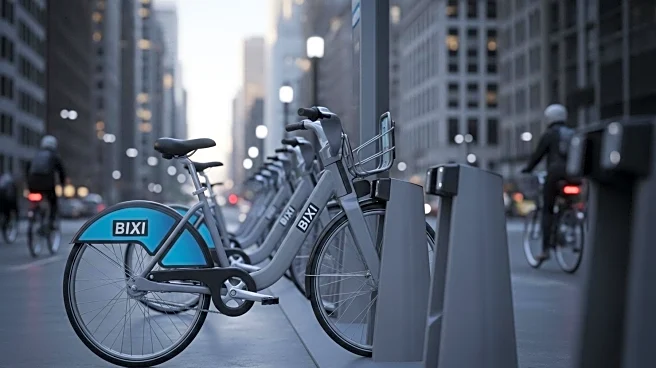What's Happening?
TIME magazine has included Montreal's bicycle-sharing system, BIXI, in its list of the top 25 inventions of the past 25 years. This recognition highlights BIXI's innovative approach to urban transportation, which has influenced bike-sharing programs globally. Introduced in 2008, BIXI was equipped with solar-powered docking stations and RFID tags, making bicycles trackable and resistant to weather and accidents. The system has become a model for similar programs in cities like London, New York, and Chicago. In 2024, BIXI bikes facilitated over 13 million trips in Montreal and more than 180 million trips worldwide. Mayor Valérie Plante praised BIXI for transforming mobility in Montreal by providing a sustainable and accessible transportation solution.
Why It's Important?
The inclusion of BIXI in TIME's list underscores the growing importance of sustainable urban transportation solutions. BIXI's success has demonstrated the viability of bike-sharing systems in reducing traffic congestion and pollution in major cities. By offering an eco-friendly alternative to traditional transportation, BIXI has contributed to a shift in urban planning priorities, emphasizing sustainability and accessibility. This recognition may encourage other cities to adopt similar systems, potentially leading to broader environmental benefits and improved urban mobility. Stakeholders in urban development and environmental policy stand to gain from the continued expansion and innovation in bike-sharing technologies.
What's Next?
The recognition by TIME magazine could lead to increased investment and interest in expanding BIXI's infrastructure and technology. Cities that have yet to implement bike-sharing systems might consider adopting BIXI's model, potentially leading to new partnerships and collaborations. As urban areas continue to seek sustainable transportation solutions, BIXI's success may inspire further innovations in the sector. Additionally, ongoing advancements in technology could enhance the efficiency and user experience of bike-sharing programs, making them even more integral to urban transportation networks.
Beyond the Headlines
BIXI's impact extends beyond transportation, influencing cultural attitudes towards cycling and sustainability. The system has helped normalize cycling as a viable mode of transport, encouraging healthier lifestyles and reducing reliance on cars. This cultural shift may lead to increased advocacy for cycling infrastructure and policies that support sustainable urban living. Furthermore, BIXI's success highlights the potential for public-private partnerships in addressing urban challenges, setting a precedent for future collaborations in other sectors.









